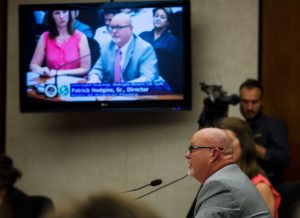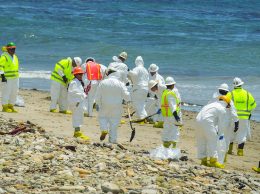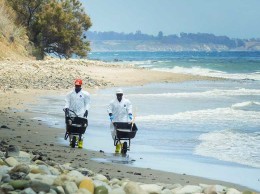Refugio oil spill cleanup costs near $100 million
IN THIS ARTICLE
- Energy Topic
- pacbiztimes Author
By pacbiztimes Saturday, June 27th, 2015

Patrick Hodgins, director of safety and security for Plains All American Pipeline, answers questions about the Refugio oil spill at the Santa Barbara County Board of Supervisors hearing room Friday. (Alex Kacik)
Plains All American Pipeline estimates that the cleanup of the oil spill near Refugio Beach has cost $96 million thus far, but the economic and environmental consequences may be more difficult to quantify.
The Assembly Natural Resources Committee and Senate Select Committee on the Refugio Oil Spill held a joint oversight hearing at the county’s board hearing room Friday afternoon. Assemblymember Das Williams and State Sen. Hannah-Beth Jackson, both Santa Barbara Democrats, lead the discussion. Assemblymember Mark Stone, D-Monterey Bay, joined them on the dais that was formed to try to figure out why the rupture occurred, how that fateful day unfolded, who’s liable and how to prevent a similar failure.
Local lawmakers, environmentalists and community members packed the room to hear from state officials, county planners, marine scientists and a representative from Plains All American, the Houston-based oil firm responsible for the Line 901 oil rupture. Public officials expressed the need for a better-coordinated response and more stringent preventative and regulatory measures.
Line 901 was built in 1987 to carry oil from Gaviota to Las Flores. By the time a Plains’ employee remotely shut down the entire pipeline because of pressure anomalies at 11:30 a.m. on May 19, the damage had already been done. That happened to be the only pipeline in Santa Barbara County that doesn’t have an automatic shut-off valve. When Williams asked Patrick Hodgins, Plains director of safety and security, why one wasn’t installed, Hodgins said that the pipeline only had to adhere to federal regulations, which didn’t mandate an automatic shut-off valve.
“It has been industry best practices that we follow not to have an automatic valve that can shut off an active line…because of the potential damage it could do if shut inadvertently,” Hodgins said.
Dianne Black, Santa Barbara County planning and development department assistant director, disagreed. She said that an automatic shut-off valve is one of the safest technologies and an industry best practice.
“I don’t know the precise cost [to install one] but I can’t imagine it would be more than the cost of the spill,” Black said.
Even though the line was shut at 11:30 a.m., members of the Santa Barbara County Fire Department were the first ones to report the spill about an hour later — not Plains. Plains didn’t confirm the release originated from Line 901 until 1:30 p.m. and didn’t notify the National Response Corporation, a federal body that coordinates emergency responses, until 2:56 p.m. When Williams asked Hodgins why it took so long, he said he couldn’t comment.
“I don’t have that information in front of me,” Hodgins said.
If Plains notified Clean Seas earlier, a Caprinteria-based oil extraction firm that Plains contracts with, it could’ve “significantly reduced the amount of oil spilled,” Clean Seas General Manager Ike Ikerd said.
California’s Oil Spill Prevention and Response Act requires the operator to report the spill to the California Office of Emergency Services within 15 to 30 minutes after it is discovered, Williams said.
“Plains did not meet that criteria,” said Mark Ghilarducci, director of the governor’s office of emergency services.
Officials lamented the fact that Plains is classified as an interstate pipeline, which means it has to abide by less stringent regulations than the state’s. Plains inspects its pipelines every three years even though the federal government only requires one every five years.
The inspection in 2012 didn’t raise enough alarm to trigger action, Hodgins said. Plains had another inspection about two weeks before the spill but didn’t receive the results in time. The Pipeline and Hazardous Material Safety Administration found that the section of pipeline in question was corroded as much as 74 percent.
“Obviously the inspection systems and safeguards aren’t working,” Jackson said.
Tonya Hoover, California fire marshal, said that if Line 901 was under the state’s jurisdiction, it would’ve been classified as “high-risk,” been inspected more frequently and had more oversight.
“There needs to be a change of law that the pipeline is designated as intrastate so it is enforceable by our program,” she said. “California is the best practice, not federal.”
As the law is written, there is some grey area when it comes to an interstate or intrastate designation, said Carl Weimer, Pipeline Safety Trust executive director.
“The industry can pretty much choose whom they are regulated by,” he said.
As of now, the tourism industry and commercial fisheries are feeling the oil spill’s sting. Refugio State Beach and El Capitan State Beach have been closed for more than a month. Fisheries from Canada de Alegria to Coal Oil Point remain closed, which has many commercial fisheries reeling.
During public comment, a Santa Barbara resident said the oil spill has crippled her sport fishing business. She said that fisherman can’t sell local fish because the name Santa Barbara seafood is tainted and the county should perform a public relations campaign.
Eventually, Plains may have to pay up for lost revenues and for such a campaign. The $96 million cleanup tab doesn’t include claims, court proceeding, penalties or lost business and tourism revenues.
“If we don’t create greater accountability, if we don’t have greater transparency and honesty in the process, if we don’t remove the oil industry from taking control, controlling the messaging and controlling the information, the public will not be with us, and rightly so,” Jackson said.










